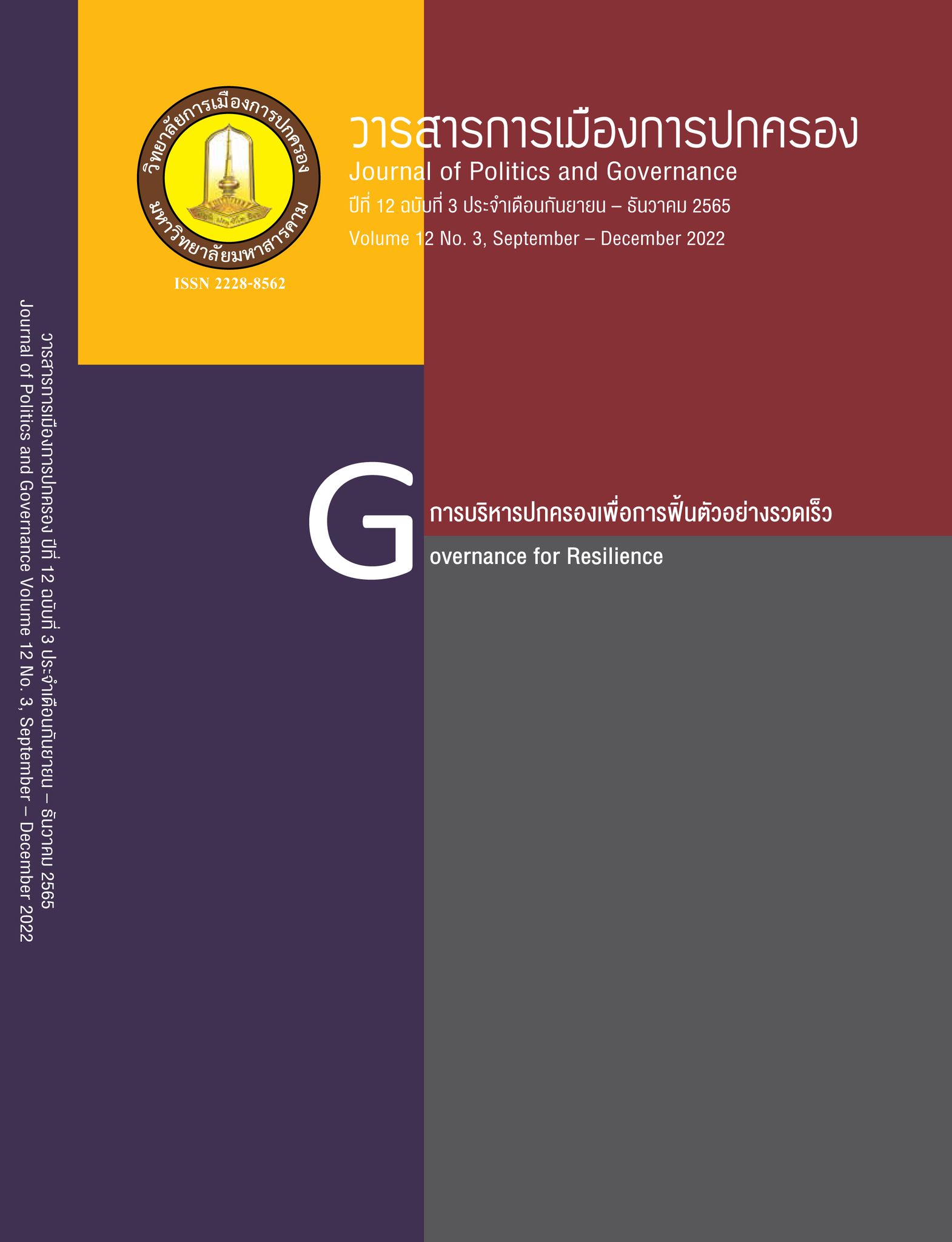Self-Management by Knowledge Management Process in Organic Farming Community enterprise, SuphanBuri Province
Main Article Content
Abstract
The objectives of this qualitative research were to: 1) investigate the knowledge management process in organic farming; 2) explore problems encountered in self-management by using the knowledge management in organic farming; and 3) present guidelines for self-management by using the knowledge management process in organic farming. Data were collected through in-depth documentation analysis, small group discussion, survey on agricultural cultivation, in-depth interview, and public discussion and reflection of the research results to related units with key informants gained by the purposive sampling. They were of 3 groups as follows: 1) agricultural academics and university instructors; 2) general and organic agriculturalists; and 3) community leaders and representatives from the public and private sectors, totaling 45 persons. Data were analyzed by using content analysis and data validated by triangulation technique. The results of the research revealed that the knowledge management process of organic farming included the following: 1) indication of need for knowledge mainly focused on organic farming; 2) knowledge selection arises from learning experienced, and mutual doing with repetition; 3) informal knowledge transfer and sharing; 4) knowledge construction putting the importance on the development which is consistent with community context; 5) knowledge gathering and keeping; 6) knowledge improvement to be consistent with needs and problems condition. Problems encountered in the self-management included the following: 1) unclear communication; 2) some of new body of knowledge were not consistent with the community context; 3) lack of support by various sectors; 4) few off springs inherited agricultural careers; and 5) the knowledge management was not systematic. The following were guidelines for the self-management by using the knowledge management process in organic farming; 1) creating knowledge awareness, and self-problem management; 2) systematic knowledge gathering; 3) people in the community can be developed through knowledge exchange venue, learning, and training; 4) creating innovative knowledge; and 5) holding knowledge occasional market.
Article Details
References
กนกวรรณ ชูชาญ. (2552). การจัดการความรู้ทางทรัพยากรทางวัฒนธรรมโดยผู้นำชุมชนเพื่อการท่องเที่ยวชุมชนบ้านผาหมอน ดอยอินทนนท์ จังหวัดเชียงใหม่ (วิทยานิพนธ์ปริญญา ศิลปศาสตรมหาบัณฑิต ไม่ได้ตีพิมพ์). มหาวิทยาลัยธรรมศาสตร์, กรุงเทพฯ.
กรมวิชาการเกษตร. (2554). การผลิตพืชอินทรีย์. กรุงเทพฯ: กรมวิชาการเกษตร กระทรวงเกษตรและสหกรณ์.
กาญจนา แก้วเทพ. (2553). การบริหารจัดการวัฒนธรรมพื้นบ้านแบบมีส่วนร่วมด้วยนวัตกรรมการวิจัย. กรุงเทพฯ: ภาพพิมพ์.
ชมภูนุช หุ่นนาค. (2559). คุณลักษณะผู้นำในการสร้างชุมชนเข้มแข็งตามแนวการทำเกษตรแบบยั่งยืน ศึกษากรณี: สหกรณ์บ้านคลองโยง อำเภอพุทธมณฑล จังหวัดนครปฐม. วารสารวิทยบริการ, 27(2), 131-138.
ไชยรัตน์ เจริญสินโอฬาร. (2554). วาทกรรมการพัฒนา (พิมพ์ครั้งที่ 5). กรุงเทพฯ: วิภาษา.
ธงพล พรหมสาขา ณ สกลนคร และอุทิศ สังขรัตน์. (2557). แนวทางการพัฒนาการดำเนินงานของวิสาหกิจชุมชนในเขตลุ่มทะเลสาบสงขลา. วารสารวิชาการคณะมนุษยศาสตร์และสังคมศาสตร์, มหาวิทยาลัยสงขลานครินทร์ วิทยาเขตปัตตานี, 10(1), 97-122.
ประภาวดี สืบสนธิ์. (2543). สารสนเทศในบริบท. กรุงเทพฯ: สมาคมห้องสมุดแห่งประเทศไทย.
ผ่องพรรณ ตรัยมงคลกูล และสุภาพ ฉัตราภรณ์. (2555). การออกแบบการวิจัย (พิมพ์ครั้งที่ 7). กรุงเทพฯ: มหาวิทยาลัยเกษตรศาสตร์.
พรธิดา วิเชียรปัญญา. (2547). การจัดการความรู้: พื้นฐานและการประยุกต์ใช้. กรุงเทพฯ: เอ็กซเปอร์ เน็ท.
พรธิดา วิเชียรปัญญา. (2552). การจัดการความรู้พื้นฐานและการประยุกต์ใช้ (พิมพ์ครั้งที่ 2). กรุงเทพฯ: ธรรกมลการพิมพ์.
มิ่งขวัญ แดงสุวรรณ. (2545). กระบวนการสร้างความเข้มแข็งของชุมชนบ้านโป่ง อำเภอสันทราย จังหวัดเชียงใหม่. (วิทยานิพนธ์ศึกษาศาสตรมหาบัณฑิต ไม่ได้ตีพิมพ์). มหาวิทยาลัยเชียงใหม่, เชียงใหม่.
วนิดา สัจพันโรจน์. (2551). การสร้างรูปแบบเครือข่ายองค์กรแห่งการเรียนรู้ขององค์การบริหารส่วนตำบล (วิทยานิพนธ์ปรัชญาดุษฎีบัณฑิต ไม่ได้ตีพิมพ์). มหาวิทยาลัยรามคำแหง กรุงเทพฯ.
วิจารณ์ พานิช. (2551). การจัดการความรู้ ฉบับนักปฏิบัติ. กรุงเทพฯ: สถาบันส่งเสริมการจัดการความรู้เพื่อสังคม (สคส.).
วิฑูรย์ ปัญญากุล, และเจษณี สุขจิรัติกาล. (2546). สถานการณ์เกษตรอินทรีย์ไทย เกษตรอินทรีย์โลก. กรุงเทพฯ: ที จี ซี พริ้นติ้ง.
วิฑูรย์ ปัญญากุล, และวิบูลย์ เข็มเฉลิม. (2546). ความรู้เบื้องต้นเกษตรอินทรีย์. กรุงเทพฯ: มูลนิธิสายใยแผ่นดิน.
สำนักงานคณะกรรมการพัฒนาการเศรษฐกิจและสังคมแห่งชาติ. (2560). แผนพัฒนาเศรษฐกิจและสังคมแห่งชาติ ฉบับที่ 12. กรุงเทพฯ: สำนักนายกรัฐมนตรี.
สุพัตรา คงขำ, และนรินทร์ สังข์รักษา. (2558). การพัฒนารูปแบบการจัดการความรู้ภูมิปัญญาพื้นบ้านหนังตะลุงเพื่อเสริมสร้างความเข้มแข็งทางวัฒนธรรมท้องถิ่น. วารสารศิลปากรศึกษาศาสตร์วิจัย, 7(1), 242-255.
สุริยนต์ ปันทะนะ. (2556). การจัดการความรู้เรื่องการอนุรักษ์พันธุ์ข้าวเหนียวสันป่าตองขององค์กรปกครองส่วนท้องถิ่นในอำเภอสันป่าตอง จังหวัดเชียงใหม่. (วิทยานิพนธ์รัฐประศาสนศาสตรมหาบัณฑิต ไม่ได้ตีพิมพ์). มหาวิทยาลัยขอนแก่น ขอนแก่น.
สุวิทย์ วงศ์คำ, และสถาพร มงคลศรีสวัสดิ์. (2561). การบริหารจัดการวิสาหกิจชุมชน กรณีศึกษากลุ่ม วิสาหกิจแปรรูปกล้วยบ้านหนองแวงเรือ ตำบลดงเมืองแอม อำเภอเขาสวนกวาง จังหวัดขอนแก่น. วารสารวิชาการธรรมทรรศน์, 18(2), 23-32.
เสรี พงศ์พิศ. (2552). คู่มือทำวิสาหกิจชุมชน. กรุงเทพฯ: พลังปัญญา
สำนักงานเกษตรและสหกรณ์จังหวัดสุพรรณบุรี. (2562). แผนยุทธศาสตร์พัฒนาการเกษตรและ สหกรณ์ จังหวัดสุพรรณบุรี (พ.ศ.2561-2564). สุพรรณบุรี: กลุ่มยุทธศาสตร์พัฒนาการเกษตร สำนักงานเกษตรและสหกรณ์จังหวัดสุพรรณบุรี.
อภิชาติ ใจอารีย์. (2557). รูปแบบการจัดการความรู้ภูมิปัญญาท้องถิ่นการแปรรูปหน่อไม้ของชุมชนบ้านพุเตย จังหวัดกาญจนบุรี. วารสารการเมืองการปกครอง, 4(2), 241-158.
Coakes, E., Amar, A. D., & Granados, M. L. (2010). Knowledge management, strategy, and technology: A global snapshot. Journal of Enterprise Information Management, 23(3), 282-304.
Dalkir, K. (2005). Knowledge management in theory and practice. Boston: Butterworth Heinemann.
Hamid, Z. A. (2015). Identifying knowledge and creating knowledgeable employees (online). Retrieved from http://www.tlainc.com/articl154.htm.
Marquardt, M. J. (1996). Building the leaning organization. New York: McGraw-Hill.
Promsaka Na Sakolnakorn, T., & Naipinit, A. (2013). Guidelines for the Management of Community Enterprises in the Songkhla Lake Basin of Thailand. Asian Social Science, 9(11), 166-173.
Sallis, E., & Jones, G. (2002). Knowledge management in education. London: Kogan.
Wasko, M., & Faraj, S. (2000). It is What One Does: Why People Participate and Help Others in Electronic Communities of Practice. Journal of Strategic Information Systems, 9(2-3),155–173.


